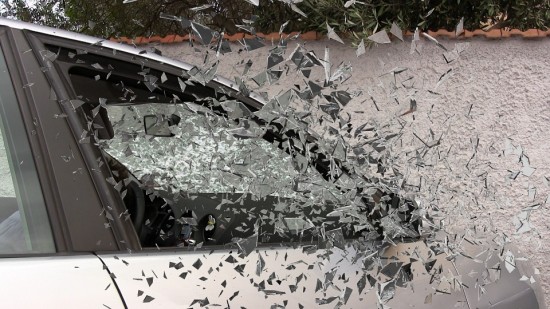Can the publishing of the recording showing how the young Almir was ran over be considered as public interest?
Published in Journalistic Lessons
on 7 - 07 - 2016 Author: Ана Анастасовска
Last weekend, the Macedonian public was shocked by the case of the 4 year old Almir from Kumanovo who was deliberately ran over, after which he died. According to the media information, the hideous occurrence was a result of a fight between the child’s parents and the suspect. A day after his death, a video of the horrible event was published
Author: Ana Anastasovska
The Albanian language news website “Telegrafi” published a disturbing CCTV recording last Saturday showing how the 4 year old Almir and his parents from Kumanovo were ran over. The recording was then republished by plenty of websites, and some of them posted it as a sensational news in order to get more comments and likes, and all of that caused strong reactions in the media sphere. Was it really necessary to publish this recording or not? This is the dilemma that arose after the social media started “erupting”. The “Telegrafi” website then removed the video from their official YouTube channel.
After the hideous recording has appeared on almost all media, some of the journalists expressed their reactions and appeals saying that the recording must be removed due to the possibility of interethnic tensions, which were easy to anticipate from the comments on the social media.
THE SENSATIONAL PUBLISHING OF THE RECORDING IS OPPOSED TO THE CODE OF JOURNALISTS
Zhaneta Trajkovska, a professor at the School of Journalism and Public Relations, used her Facebook profile to ask the journalists that published this recording what’s their justification for such move.
“What’s the public interest here? Additional increasing of sensitivity, spurring ethnic intolerance, website click bait, crowing over somebody’s pain, or you are working for Grujo and Ali to remain in power for 10 more years?! What kind of public interest are you defending and what is your ethic justification for publishing such hideous recording?! Did you discover something we did not know, except that people are monsters?! It is certain that you do not work on citizen’s behalf and for protection of the public interest. Give me an ethic norm that justifies you! Tell me the human norm that will justify you at home! Have you lost your mind? Do you have a mind at all?” – Trajkovska wrote.
The Council of Media Ethics of Macedonia (CMEM) also expressed their reaction by pointing out that publishing such content causes additional anxiety and wrath in the public regarding this incident and its consequences. They stated that the sensational informing has no advantage over the professional and ethic informing, and the journalists must take the family’s tragic consequences into account.
“The publishing of the recording violates Article 8 from the Code of Journalists ‘The manner of informing in case of accident, elementary disaster, war, family tragedy, sickness, court procedures must be free from sensationalism’. Although this manner of informing by some media can be justified by the need of satisfying the public interest and by the understanding of the incident’s size, we emphasize that journalists and editors ought to respect people’s privacy, which is in accordance with Article 7 from the Code of Journalists of Macedonia”, is stated in CMEM’s press release.
They also appealed to the media to pay attention to the goal and the consequences their informing might cause, as well as to be cautious about the public that can come into contact with the disturbing content.
“Besides, we pointed out to the editors that by publishing such material they allow further spreading and they make it easily accessible to vulnerable categories and minors, and such informing can cause additional anxiety and consequences”.
THE PUBLIC HAS THE RIGHT TO KNOW
The editor of “Sloboden pechat” daily and manager of the “Plusinfo” website, Branko Gjeroski, decided not to publish the recording the day it appeared. However, a day later, he thought that the public has the right to see it.
“The day when the recording appeared on the websites, in which we can see how the driver runs over the Aliu family, after which the young Almir lost his life, was not published by “Plusinfo”. This is a disturbing recording, it also increases the pain of Almir’s closest relatives and can also spur vengeance. That was the reason why we did not want to add fuel to the fire on the day when the scheduled protest was held. But, regardless its disturbing content, the public has the right to see this horrifying recording from Kumanovo, showing one really monstrous murder, an act which is difficult to explain, let alone to justify”, – Gjeroski points out.
He says he published the recording in his own way, as he estimated he should.
“Some media acted differently. Some published it sensationally, others published it and then deleted it, whereas third ones decided to spare the public from this tragic evidence of lunacy. We do not argue with anyone’s decision. Everyone has own arguments. By using the necessary dosage of caution, imposed by the one-day embargo, our decision is unambiguous – the highest principle in the journalistic ethics won, the public has the right to know”, Gjeroski stated.
WHAT DOES THE CODE OF JOURNALISTS SAY
Article 7 from the Code of Journalists clearly says that:
The journalist is obliged to respect the personal pain and grief.
Furthermore, Article 8 says:
The manner of informing in case of accident, elementary disaster, war, family tragedy, sickness, court procedures must be free from sensationalism.
These rules are more thoroughly explained in the Manual for Ethics in Journalism published by the Association of Journalists of Macedonia (AJM). Namely, in the section dedicated to the Code of Journalists – instructions and recommendations, on page 18 is emphasized that:
The right of the public to be informed cannot be a justification for the need of sensation.
On page 19 is written:
Reports have to take the victim’s family into account, not to increase their pain, but also not to lead to their stigmatization.
WHAT’S PUBLIC INTEREST IN MEDIA
Can the publishing of the recording from the hideous event in Kumanovo, showing how the young Almir was ran over, be considered as public interest? It is correct that the public interest is not defined in any media related law. The Manual for Public Interest in Journalism defines it as “what’s of interest or benefit for most people in the society”. However, as stated in the Manual, the journalists often cannot distinguish what’s the public (audience) interested in and what’s public interest, i.e. benefit for the society.
“Public interest is not something the public is interested in, something that the audience wants to know and it does not mean satisfying its curiosity neither can be justified as moral criterion for somebody’s scandalous behavior. Public’s right to know cannot be an excuse for peeking in somebody’s personal life. Unrevised information and anonymous recordings simply cannot be published on behalf of protection of public moral”, is stated in the Manual.
When determining what public interest is, the journalists must obey these 10 basic principles:
- Confidence and protection of public interest;
- Promptness and truthfulness;
- Impartiality;
- Transparency;
- Accountability;
- Integrity and editorial independence;
- Righteousness;
- Detriment and insult;
- Privacy;
- 10. Protection of children and youth.
This journalistic lesson was created within the framework of the USAID Media Strengthening in Macedonia Project - Media Fact-Checking Service Component,, mplemented by Metamorphosis. The journalistic lesson is made possible by the generous support of the American people through the United States Agency for International Development (USAID). The contents are the responsibility of its author and do not necessarily reflect the views of Metamorphosis, USAID or the United States Government. For more information on the work of USAID in Macedonia please visit its website (http://macedonia.usaid.gov) and Facebook page (www.facebook.com/USAIDMacedonia).


